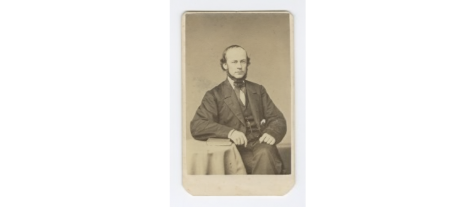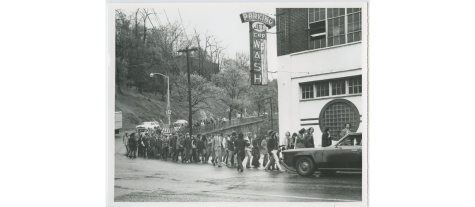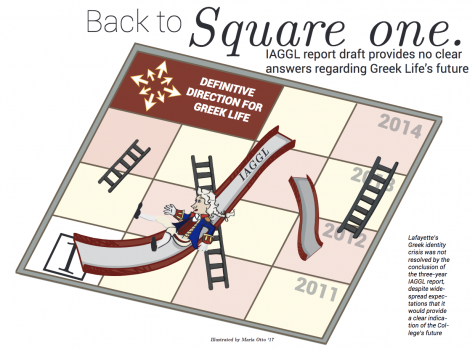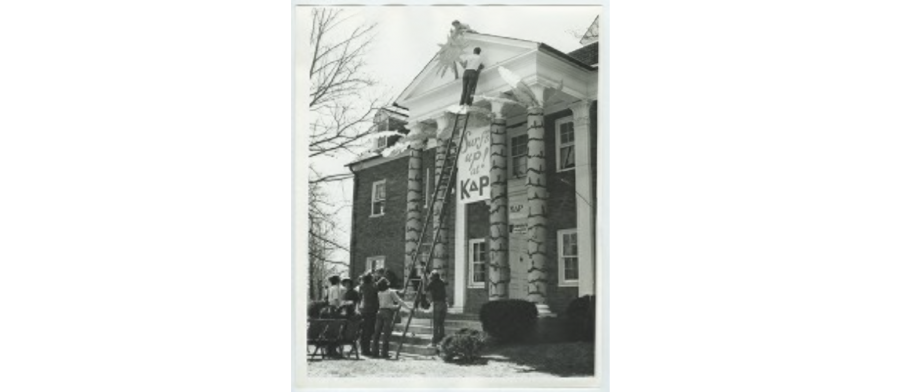‘Fraternities are in danger’: Moments of public debate over Greek life from 1857 to today
The Kappa Delta Rho fraternity house decorates in 1975. (Photo courtesy of Lafayette College Archives)
November 20, 2020
“Currently, an ‘in’ thing for college students to do is to deprecate fraternities,” wrote a feature writer for The Lafayette. That was 50 years ago.
Now, in the fall of 2020, the newest movement to abolish Greek life has begun.
This time around, the @abolishgreeklifeatlaf Instagram account, which began on Sept. 8 and has amassed over 1,000 followers, has given a platform to individuals who feel that the institution of Greek life has no place on campus, citing elitism, alcohol abuse, racism and sexual misconduct among their concerns. Student government has responded to this movement, launching a survey and announcing the results in a public meeting yesterday.
The role of Greek life on Lafayette’s campus is as strong as ever. Nearly 40% of upper-class students are involved in fraternities and sororities, according to the Lafayette Greek Life website. In 2019, these organizations made nearly $63,000 in philanthropic donations, and the social outlet they provide has been defended time and time again as an integral part of many students’ collegiate experiences.
As criticism and calls for abolishment dominate the Greek life discourse today, past conversations are echoed in the present. And while the future of the 2020 Abolish Greek Life movement is uncertain, it falls into a long but sporadic tradition of arguments against one of the most dominant institutions on Lafayette’s campus.
Take a look at these six moments in the college’s history where Greek life came under fire and what did—and did not—come out of them.
1. “War on Fraternities,” 1850s-1860s
It didn’t take long for the college’s first conflict with Greek life to begin. The first fraternities, Phi Kappa Sigma and Delta Kappa Epsilon, were organized in 1853 and 1855 respectively, just 26 years after the college’s founding. David Skillman chronicled their turbulent first few years in his book, “The biography of a college: Being the history of the first century of the life of Lafayette College.”
At the time, fraternities were secret societies that gained charters from their national organizations without consent from the college and met in rooms in downtown Easton because they could not risk gathering on campus. The college administration, which at the time was strongly affiliated with the Presbyterian Synod of Philadelphia, opposed fraternities because they were viewed as semi-religious organizations, according to Skillman.
In 1857, trustees addressed the presence of these groups by instructing each first-year student to pledge to “not join any secret society.”
The pledge was not quite as effective as it was intended to be—a number of students evidently got away with not signing it, and two more fraternities were organized in the next few years. So in 1863, board member Samuel Fisher Colt, class of 1837, sponsored a resolution “forbidding all such organizations” permanently.
Only one fraternity, Delta Kappa Epsilon, paid any attention to the rule. The rest ignored it completely and continued to expand by initiating new members.
In the spring of 1867, Phi Kappa Sigma and Zeta Psi petitioned the faculty to withdraw the official prohibition of fraternities. When trustees, specifically Colt, maintained their position that fraternities plagued the college community, fraternity members rebelled, destroying benches in the chapel room and vandalizing classrooms in July of 1867.
As a result of these disorders, the college’s pledge requirement was effectively dropped, as the college seemingly realized that it would not stop students from joining. From there, Greek life began to grow, this time without the hindrance of the college.

2. Reflection on the Value of Greek Life in the 1940s
Another moment in which Greek life entered the realm of public discussion was during World War II. At this time, the college’s Post-War Planning Committee prepared a report published in 1944 that addressed a number of concerns for the return to college life, which included the Greek system.
The report noted a “tendency to question the worth of the college fraternity” over the last ten years. It cited the Greek system’s hierarchical structure leading to “snobbery which has no place on a democratic college campus,” its encouragement of conformity that reduces students to “one social and intellectual level” and distractions that hinder academic performance as potential drawbacks to Greek life.
The report then expressed a need for policies to set chapter membership limits, force fraternity houses to be located on or near campus, abolish fraternity chapters when needed and abolish hazing altogether.
However, with the sudden return to “normal” college life in the fall of 1945, concerns expressed in the report were largely brushed aside, according to the “Lafayette College and the Greek Experience” website.
3. Protests and Image of the 1960s & 1970s
Like many social institutions at the time, Greek life came under fire again in the 1960s and 1970s. As a result of anti-war sentiment and “hippie” culture, college students around the country were protesting a number of institutional structures at both a national level and a school level. One of these institutions, according to the Greek experience website, was participation in Greek life.
In 1970, The Lafayette reported a “trend downward in fraternity popularity for some time.” Another article published in the same year declared fearfully that “Fraternities are in danger.”
Defenders of Greek life stormed the editorial pages of The Lafayette in 1970, declaring their organizations beneficial for the community.
“I am a fraternity man and therefore have been defending the system for almost three years,” one student wrote. “But why is it that fraternity men who constitute a majority of the student body always find themselves in a defensive position when talking about their form of social living? Are our positive aspects such as brotherhood and self government so nebulous that they defy verbalization?”
The image of the fraternity at this time was further damaged by incrimination due to drug use. The Greek experience website detailed a loss of alumni support at this time as a result of the increased association between Greek life and drug use.
Financial issues plagued fraternities in the early 1970s, and the Interfraternity Council ultimately disbanded in 1972 due to debt. In the same year, the Board of Trustees announced the appointment of a special committee to study fraternities in order to pinpoint problems within the institution, specifically financial and maintenance obligations and relations with alumni and the college.

4. 1981 Controversy Over DU Party
By the 1980s, hippie protests of Greek life had seemingly had little long-term effect: the Interfraternity Council was revived and the college even saw the addition of six sororities and a Panhellenic Council by the end of the decade, further expanding the role of Greek life on a now co-ed campus.
All of these changes were not without controversy, however. In February 1981, Delta Upsilon threw a highly contested party with the theme “Back to the Womb.” According to The Lafayette, the fraternity house was explicitly decorated to resemble a woman’s womb. A sign hanging behind the bar read “ALW — Association of Lafayette Wombs,” likely a derogatory reference to the Association of Lafayette Women (ALW) student group.
The Lafayette reported the outrage at the event from the ALW, the Professional Women of Lafayette and the Panhellenic Council, along with college President David W. Ellis. A number of students, both female and male, and faculty members demanded a public apology from Delta Upsilon. News of the party circulated in the Easton Express newspaper, leading to further backlash from the surrounding community.
The Professional Women of Lafayette wrote a Letter to the Editor the next week, stating. “The party’s theme derives from a demeaning stereotype…That this incident could occur, and be accepted by many students, both female and male, reveals that the social climate at Lafayette is generally dehumanizing to women.”
The intersection between fraternity culture and a recently co-ed campus clearly resulted in outrage at this moment. However, after Delta Upsilon’s $1,000 required payment to the college as a penalty and occasional references to the “infamous” party in years to come, the long term cultural effects of the incident are difficult to ascertain.

5. Review of Greek life under Daniel Weiss’s tenure as College President
During Daniel H. Weiss’s tenure as college president from 2005-2013, Greek life came under public scrutiny a number of times. At the time of his departure from the college, three fraternities had shut down on-campus activities and three of the remaining four were either on probation or were recently taken off probation, according to The Lafayette.
In May 2011, the college submitted their Greek Life Working Report to the Board of Trustees. Work to assemble the report began in October 2009 with the intent to understand the benefits of membership in Greek life and to preserve these benefits.
A summary of the report stated that “there is clearly a need to revisit the purpose of [Greek] organizations.” It acknowledged the potential for Greek organizations to bring positive contributions to the college and presented 31 recommendations “intended to transform the Greek community and to improve its relationship with the College.”
In December 2011, Weiss announced the Implementation and Assessment Group on Greek Life (IAGGL) period that aimed to address “serious concerns” about the differences between Greek members and the general student population in areas such as academic achievement and student behavior, according to The Lafayette. The IAGGL worked to assess the benefits and drawbacks of Greek life at Lafayette, and its report was released in the spring of 2014.
The 2014 Report on the Implementation and Assessment Group on Greek Life addressed the implementation of some of the 2011 Greek Life Working Report’s recommendations and used statistics to compare the performances of affiliated and non-affiliated students..
The report was regarded by The Lafayette as “hazy recommendations regarding the future of Greek life” that failed to give a firm recommendation on the decision to potentially expand the Greek system. Another article titled “IAGGL metrics don’t fly” raised concerns about the report’s statistical approach to comparison.

6. 2020 Abolish Greek Life Movement
The presence of multiple reform-focused Instagram accounts in 2020 such as @abolishgreeklifeatlaf, @anti-violence.laf and @black.at.laf have already prompted a number of discussions about the place of Greek life on campus. In September, the Student Government Greek Life Committee finalized a new Greek organization accreditation process with an increased focus on sexual assault and harassment, anti-Black racial discrimination, multiculturalism and hazing to be implemented in the 2020-2021 school year.
The college’s Delta Delta Delta chapter relinquished their chapter in September, and the Delta Tau Delta fraternity announced on their Instagram page this week that they would postpone rush for sophomores until the spring in order to “acknowledge the issues present in Greek life.”
Yesterday, Student Government unveiled the results of their Greek life survey, which suggested that Lafayette remains highly polarized on the issue. Lauren Ameruoso ’22, Director of Student Government’s Greek Life Committee, noted that the campus is divided between affiliated and non-affiliated students as to whether Greek life has positively impacted their experience on campus. The survey results will be presented to the Board of Trustees in December, and what happens next is still up in the air.























































































































Jeff Ruthizer • Oct 14, 2023 at 11:29 am
It’s impossible for this alumnus from the class of 1962 to read this 2020 article purportedly tracing the life of fraternities at Lafayette without scratching my head in bewilderment. How such an article could be written without mentioning the religious and racial discrimination built into the fraternities’ national charters when each was founded permitting only white males of the Christian faith to be admitted into each of the 18 of the 19 brotherhoods on campus. The exception was the one fraternity founded to permit students of the Jewish faith to have a decent social life on campus. Two of the others challenged their national organizations by admitting Jewish students despite the charter restrictions and became mixed houses. It all came to a head in the early 1960s. Next time do a little better research on such an important subject and do not rely solely upon Skillman’s otherwise excellent two volumes.